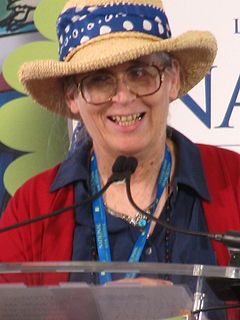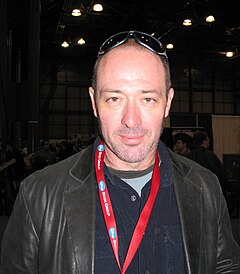
Science fiction is a genre of speculative fiction which typically deals with imaginative and futuristic concepts such as advanced science and technology, space exploration, time travel, parallel universes, and extraterrestrial life. It has been called the "literature of ideas", and it often explores the potential consequences of scientific, social, and technological innovations.

The Salmon of Doubt: Hitchhiking the Galaxy One Last Time is a posthumous collection of previously published and unpublished material by Douglas Adams. It consists largely of essays, interviews, and newspaper/magazine columns about technology and life experiences, but its major selling point is the inclusion of the incomplete novel on which Adams was working at the time of his death, The Salmon of Doubt. English editions of the book were published in the United States and UK in May 2002, exactly one year after the author's death.

The Three Laws of Robotics are a set of rules devised by science fiction author Isaac Asimov. The rules were introduced in his 1942 short story "Runaround", although they had been foreshadowed in some earlier stories. The Three Laws, quoted from the "Handbook of Robotics, 56th Edition, 2058 A.D.", are:

Crime fiction, detective story, murder mystery, mystery novel, and police novel are terms used to describe narratives that centre on criminal acts and especially on the investigation, either by an amateur or a professional detective, of a serious crime, generally a murder. It is usually distinguished from mainstream fiction and other genres such as historical fiction or science fiction, but the boundaries are indistinct. Crime fiction has multiple subgenres, including detective fiction, courtroom drama, hard-boiled fiction, and legal thrillers. Most crime drama focuses on crime investigation and does not feature the courtroom. Suspense and mystery are key elements that are nearly ubiquitous to the genre.

Elizabeth Moon is an American science fiction and fantasy writer. Her other writing includes newspaper columns and opinion pieces. Her novel The Speed of Dark won the 2003 Nebula Award. Prior to her writing career, she served in the United States Marine Corps.

Richard Kingsley Morgan, is a British science fiction and fantasy author of books, short stories, and graphic novels. He is the winner of the Philip K. Dick Award for his 2003 book Altered Carbon, which was adapted into a Netflix series released in 2018. His third book, Market Forces, won the John W. Campbell Award in 2005, while his 2008 work Thirteen garnered him the Arthur C. Clarke Award.
John Andrew Sutherland is a British academic, newspaper columnist and author. He is Emeritus Lord Northcliffe Professor of Modern English Literature at University College London.
Thomson William "Thom" Gunn, was an English poet who was praised for his early verses in England, where he was associated with The Movement, and his later poetry in America, even after moving towards a looser, free-verse style. After relocating from England to San Francisco, Gunn wrote about gay-related topics—particularly in his most famous work, The Man With Night Sweats in 1992—as well as drug use, sex and his bohemian lifestyle. He won major literary awards; his best poems were said to have a compact philosophical elegance.

Michael Whelan is an American artist of imaginative realism. For more than 30 years, he worked as an illustrator, specializing in science fiction and fantasy cover art. Since the mid-1990s, he has pursued a fine art career, selling non-commissioned paintings through galleries in the United States and through his website.

John Birmingham is a British-born Australian author, known for the 1994 memoir He Died with a Felafel in His Hand, and his Axis of Time trilogy.
Christopher R. Bunch was an American science fiction, fantasy and television writer, who wrote and co-wrote about thirty novels.

Alisa Kwitney is a writer of comedic romance novels and graphic novels.
David Sherman is an American novelist who deals overwhelmingly with military themes at the small-unit tactical level. His experiences as a United States Marine inform his writings.
Allan Cole was an American author and television writer, who wrote or co-wrote nearly thirty books.

Dragon's Kin is a science fiction novel by the American-Irish author Anne McCaffrey and her son Todd McCaffrey. Published by Del Rey Books in 2003, it is the eighteenth book in the Dragonriders of Pern series and the first with Todd as co-author.
Sarah Smith is an American author living in Brookline, Massachusetts.
Richard Foss is an American journalist, science fiction author, and food historian who has also chaired science fiction conventions and worked as a travel agent, restaurant reviewer, theater director, and instructor in Elizabethan history and culinary history at Osher Institute/UCLA Extension.

Immortality is a common theme in fiction. The concept has been depicted since the Epic of Gilgamesh, the oldest known work of fiction. Originally appearing in the domain of mythology, it has later become a recurring element in the genres of horror, science fiction, and fantasy. For most of literary history, the dominant perspective has been that the desire for immortality is misguided, albeit strong; among the posited drawbacks are ennui, loneliness, and social stagnation. This view was challenged in the 20th century by writers such as George Bernard Shaw and Roger Zelazny. Immortality is commonly obtained either from supernatural entities or objects such as the Fountain of Youth or through biological or technological means such as brain transplants.
Death's Head is a noir military science fiction series written by David Gunn (author). The series follows the antihero Sven Tveskoeg, an ex-sergeant of The Legion, in service to the Octovian Empire. The series is narrated in the first-person from Sven's point of view, giving the reader a limited scope on the situations that surround Sven, but as the series progresses, Sven gets more and more entwined into the galactic politics surrounding him.
James Swain is an American crime fiction author and magician.










